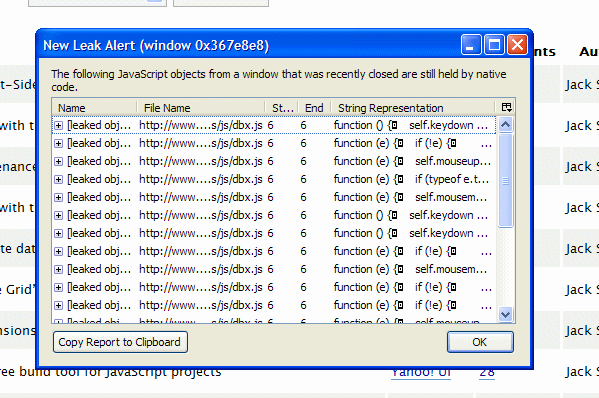你可能还未知道,你浏览的大多数的js网站,会引起 内存泄漏。听起来有点夸张,但这是事实,难道我会骗你吗?
泄漏监视器
这是个方便的FireFox扩展,当你离开那页的时候它便会指向JavsScript对象,如果出现泄漏的话会弹出一个窗口显示细节内容,而且能够告诉你是那个对象或函数引起的泄漏。
离开http://script.aculo.us/的时候
这应该我是最常见的泄漏 prototype.js, line 74:3
The Dojo Mail 例子页面
严重的泄漏,一下子弹出两个窗口 (注意滚动条!)。
Word Press
这个更离谱。我每次写完Word press,就会出现!

访问一般的站点,你会发现大多数站点都会出现这类问题。的确,如果一些网站没有经过这样的测试,多少会让人感到震惊,--本来适当一下的修改就可以确保这种问题不会发生。
虽然这网站(Jack'sBlog、范例)统统都是JavaScript的,但你不必担心任何泄漏的危险。
如下简单的三步:
1. 当你完成后,设置你的 XMLHttpRequest onreadystatechange handlers 为null,
我使用 YAHOO.util.Connect 来进行XHR链接 ,因为它使用了 polling mechanism来代替readstate, 这样我不用手工set null了。我推荐你,在允许的情况下,使用YAHOO.util.Connect (或建于其之上的 YAHOO.ext.UpdateManager)。
2. 在unload事件中清除所有 DOM event handlers object ,如果它们有引用 (Refence)的机会的话。
能够让Library做的,就不要用自己的方法做! 对于事件event的机制,我均使用了YAHOO.util.Event来处理. 其它的library (prototype, dojo, etc) 亦有自己的相应的机制来处理。 --尽管我不清楚它们的执行效率去到那里。 如果你再仔细看看上面的截图,你会发现上面的泄漏代码都会关联到这些library里面去(用事实证明事故的源头,Frank注)
3.除了一些基本类型的数据primitive value (String 、Number),切勿放其它任何东西在 DOM expando 或 property 。当然,你能保证及时清除它的话,便是一个例外。
这就是最重要的金科玉律了。在DOM expando放东西,你会觉得很方便, 然后用 $()获取它, 但千万不要这样做。 真的,我知道你在想什么,现在的我已经有线想妄想症的认了.没错,很多场合都会把JS对象放到 DOM expando,也没啥状况发生,但也会有很多。。。。这种情况不容易检查出来啊!(例如:闭包closures). 所以要避免任何可能的发生,我只会按照这样的规律做.
摘要
解决这个问题并不是太难。它不需要任何技巧或经验之谈。只要注意好以上几点,一个新手novice也知道如何避免泄漏。
请拜托一些大网站(包括新的 Yahoo Mail!?!?),花点时间,做足功夫,让我(或其他人)浏览你的网页而不遭受内存泄漏。

